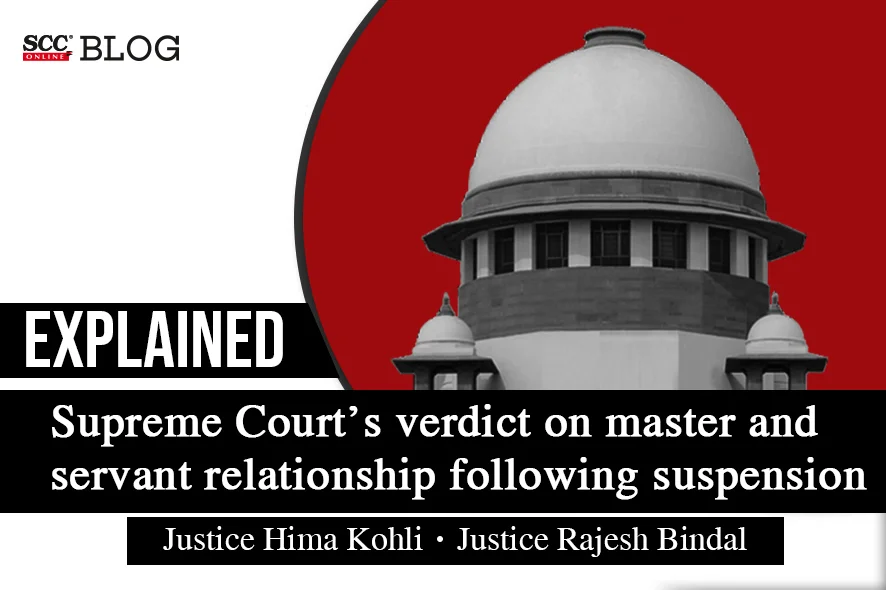Supreme Court: In an appeal filed by the workman/ appellant against the order passed by the Division Bench of Delhi High Court, wherein the Court upheld the Single Judge order setting aside the Tribunal’s award directing Punjab National Bank (‘PNB’) to reinstate the workman/ appellant with full back wages along with interest and consequential benefits, the division bench of Hima Kohli and Rajesh Bindal, JJ. while upholding the impugned order, said that as per Clause XVI in the Bipartite Agreement the workman could have been treated to have been voluntarily retired immediately upon expiry of 90 days from 28-09-1983 as he had failed to join duty. Despite this, the Bank was magnanimous enough to have issued a final notice to the workman granting him 30 days’ time to report for duty.
Background:
The workman was appointed with the PNB on 20-06-1977 as Clerk cum-Cashier. On 14-06-1982, he was suspended on account of his disorderly behavior. On enquiry, the workman was found guilty of the charges and awarded punishment of stoppage of two graded increments with cumulative effect vide order dated 28-09-1983. He was also advised to report for duty to the Manager, Branch Office. The workman failed to join duty. In terms of Clause XVI9 of the Bipartite Agreement between Indian Banks’ Association and Workmen Unions, vide order dated 05-12-1984, the workman was deemed to have voluntarily retired from service. Aggrieved by this, six years later, the workman raised a dispute about his deemed retirement before the Assistant Labour Commissioner. On 15-11-1991, the dispute was referred to the Tribunal for adjudication. The Tribunal ruled in favour of the workman. However, the Single Judge reversed the award of the Tribunal, and the Division Bench upheld the order passed by the Single Judge, Thus, the workman filed the present appeal.
Analysis:
The Court noted that the workman never challenged the order of punishment or his transfer before the competent authority or the Court. He was only aggrieved with his posting to the Branch Office. Instead of joining his new place of posting, he continued writing letters.
After perusing Clause XVI of the Bipartite Agreement, the Court noted that in case a workman absents from work consecutively for 90 days or more, without submitting any application for leave, the Bank is entitled, after 30 days’ notice, to conclude that the employee has no intention to join duty and is deemed to have voluntarily retired on expiry of the notice period of 30 days.
The Court said that a person aggrieved by the order of transfer cannot sit at home and decide on his own that the order is illegal or erroneous and he will not comply with the same. If the workman had any grievance, he could have availed of his remedy available against the same; otherwise, he was duty-bound to comply with the same. Failure to avail of any remedy also would mean that he had accepted the order and was duty-bound to comply with the same. Later, he could not plead that the order being erroneous, no consequence would follow for its non-compliance.
The Court noted that a letter was issued to the workman reminding him that despite his transfer to the Branch Office, he had not yet reported for duty. He was given ten days’ time to report for duty or latest by 05-01-1984. It was also stated that otherwise, it shall be presumed that he was absent unauthorisedly and disciplinary action would be taken against him in terms of the Bipartite Agreement. This was followed by another letter dated 05-01-1984. The Court said that the intention of the workman was quite evident from the subsequent events, that he intended to join legal practice, which he did.
The Court said the workman’s idea seemed to be to remain in practice of law and enjoy payment of subsistence allowance without working. It further noted that in response to letters from the Bank, he again raised the issue regarding non-payment of his subsistence allowance but did not mention his address, thus making sure that he could take a plea that none of the communications from the Bank were received by him.
The Court noted that though the period of 90 days had already expired after 28-09-1983 and the workman was absenting from duty without any application despite repeated notices served upon him, still the Bank sent a notice to the workman at his last known two addresses on 05-10-1984 referring to Clause XVI of the Bipartite Agreement. Notice was also published in Lucknow and Allahabad Editions of North India Patrika, as an abundant caution, as the workman had not been furnishing his address in any of his communication. Thereafter, the workman sent many letters without address.
The Court said that the workman, who was legally trained, was trying to drag the Bank into avoidable litigation instead of complying with the orders. Even after gaining knowledge of his deemed voluntary retirement in 1984, the workman kept quiet for a period of six years before raising a dispute before the Assistant Labour Commissioner.
The Court while rejecting the argument of the workman, that being on suspension, he could not have been treated to have been voluntarily retired as per the deeming provision, said that during his suspension also, the relationship of master and servant does not come to an end. All the rules and regulations governing the post continue to apply. Merely because the Bank had stopped paying subsistence allowance to the workman does not mean that the workman was no more an employee of the Bank.
[U.P. Singh v. Punjab National Bank, 2023 SCC OnLine SC 1681, decided on 14-12-2023]







